Do you ever feel like you have too many alternatives to choose from? And, do you ever feel like no matter what you decide, you will end up regretting your choice and wondering whether another option would have been better? Well, the good news is that you are not alone. Many people indeed experience the so-called paradox of choice, which is a consequence of what Barry Schwartz defines as the official dogma of Western industrial societies [1].
According to this dogma, maximising individual freedom is crucial for boosting citizens’ welfare since individual freedom is not only invaluable and indispensable to each of us as human beings but also allows us to make decisions for ourselves on our own, without anyone intervening to choose on our behalf. Therefore, to put it simply, maximising individual freedom means maximising individual choice.
This idea that the greater choice people have, the more freedom they have is deeply embedded in our everyday life. Just think of when you go grocery shopping: no matter the size of your local supermarket or the goods you need to buy, you will always face a plethora of alternatives to choose from. On the one hand, being granted access to so many options makes you think you will have a better chance of finding the one that most suits and satisfies your needs. On the other hand, however, being presented with multiple alternatives actually implies a greater effort when you need to come to a decision, leading you to feel both overwhelmed and, in the end, unsatisfied as you may end up believing that you could have picked a different and better option [2]. And it is precisely here that FOBO arises.
FOBO (Fear of a Better Option)
If you are not familiar with FOBO, it is best to start with a better-known term, that is, FOMO. This acronym, invented by Patrick McGinnis, is short for Fear Of Missing Out, and it refers to the anxious feeling that is created and repeatedly fueled by social media that something better out there is happening than what you are doing at the moment and also to the constant fear of being excluded from group experiences [3]. Nowadays, this feeling is quite common. As a matter of fact, every day, whenever you check your social media feeds, you come across your friends eating out at some fancy restaurant or famous influencers going on holiday in some exclusive location, that is, content that leads you to believe that you are falling behind since, while everybody else is enjoying their life, you are just laying in your bed and looking at your phone screen.
Sadly though, there is another fear you need to be aware of, a fear that can be considered the evil twin of FOMO and that could be even more harmful. It is called FOBO, an acronym that is still Patrick McGinnis’ brainchild and that is short for Fear Of a Better Option [4]. To experience it, you must, by definition, have plenty of options, which is no big deal since, as previously mentioned, we live in a choice-rich world where even simple decisions, such as buying groceries, are fraught with overthinking and overanalysis.
The Internet and the massive success of e-commerce websites have further exacerbated this issue as, online, we are able to discover and access an endless number of different versions of any product or service. For instance, if you wanted to purchase a body sponge, you would have to scroll through thousands of items and look into hundreds of customers’ reviews, so an excessive amount of information just to buy such an ordinary object. Consequently, chances are you experience FOBO on a daily basis as, every single day, you need to make decisions that force you to choose one option out of a boundless group of perfectly acceptable alternatives.
The question, therefore, arises spontaneously: is having endless choices bad? Well, even though it may seem counterintuitive, since we are generally led to believe that being able to choose among many suitable options is a privilege, FOBO generates such extreme analysis paralysis that it can negatively affect every aspect of our life. Indeed, when you fail to make decisions rapidly and firmly, you waste precious time and energy that you could have devoted to other worthy activities.
Such claims might sound a bit pessimistic. However, luckily, it is possible to overcome FOBO. As perfectly explained by Patrick McGinnis himself in his How to make faster decisions TED Talk, the secret is to determine the stakes with any choice you have to make so that your decision-making process will be more informed and, above all, smoother. Notably, by adopting this approach, you will manage to effectively split any decision into three main categories:
No-stakes decisions
No-stakes decisions are those that, most of the time, do not have a wrong answer and, therefore, are easily forgotten within a few hours after making them. An example is deciding which movie to watch on Netflix. Obviously, with hundreds of movies available on the streaming platform, it is easy to get overwhelmed, yet no matter what you select, negative long-term effects are fundamentally nonexistent.
From this perspective, spending plenty of time deciding whether to watch The Wolf of Wall Street or Catch Me If You Can is pointless. But how to move on? Well, considering that, in these cases, the stakes are at their lowest, the best solution is to leave decisions up to chance [5]. For instance, you could simply flip a coin, assigning one of the options to heads and the other to tails. By doing so, you would not only get rapidly over your decision but also avoid blaming yourself if the elected movie is not to your liking.
Low-stakes decisions
Low-stakes decisions demand a bit of reasoning as they can lead to many different acceptable outcomes and have some sort of consequences on our lives, even if not dramatic ones. This category encompasses daily decisions in the office, such as purchasing laptops for employees working from home or booking a venue for a meeting, that is, decisions that, although requiring some thinking, will slip your mind in a matter of weeks as no one will get hurt if, with hindsight, it will turn out that you could have chosen a better option.
Therefore, when faced with these types of choices, you can still outsource your decision-making process. However, since a little bit of critical thinking is involved, it is wiser to count on another person rather than on chance [5]. For example, you could set out your alternatives and arguments to a trusted person and then accept their recommendation immediately, whatever it might be and without any second thought.
High-stakes decisions
High-stakes decisions are those that have a considerable long-term effect on our lives, such as enrolling in university or accepting a job. In other words, we are talking about decisions for which we do not want to make any mistakes as they carry significant risks.
For this reason, when facing such crossroads, it is crucial to establish some basic principles and concentrate on what truly matters to you [5]. Then, after setting out your decision-making framework and your objectives, you need to collect relevant facts about your options. This data gathering can simply result in a list of pros and cons, but, in order to avoid unnecessary second thoughts, it must be focused on your core values. For instance, if you are sensitive to issues like animal abuse, you will turn down a job from a cosmetics company renowned for testing products on animals and take into consideration job offers from cruelty-free organisations, even if it means missing out on a higher salary. Thereby, this decision-making method allows you to only contemplate alternatives that are already perfectly acceptable to you, meaning that any possible inconvenience or drawback will be limited.
Once you have defined your ground rules, the actual decision-making process can begin. It can be conceived as an elimination round as, to make it smoother, it is best to trigger it by selecting a front-runner option based on your instinct and then start comparing it with the other alternatives until you get down to one final choice [5]. The key to avoiding FOBO is to remember that whenever you get rid of an option, it is gone for good as, if you keep dwelling on what you have discarded, you will undoubtedly get stuck and end up never making a decision.
If you adopt this approach, you will generally manage to come up with independent decisions. However, if you still sometimes find it challenging to choose on your own, you will need to get help, outsourcing the final choice to a small group of qualified and trusted people [5]. On these occasions, the trick is to reach out to an odd number of people so that you can always be sure to have someone able to cast the deciding vote.
Once you have finally made your choice, the last thing to do is to commit as you will never know whether you have made the perfect decision, but you will undoubtedly feel more rewarded if you have put a lot of effort into reaching a certain aim. Furthermore, as Patrick McGinnis himself suggests, whenever we feel overwhelmed by the huge amount of choices we have to make daily, we should remember that many people in the world will never have to worry about FOMO or FOBO at all.
“Unlike the billions of people who have few options, if any, due to war, poverty or illness, you have plentiful opportunities to live decisively. You may not get everything you want, but the mere fact you get to decide is powerful. In fact, it’s a gift. Make the most of it.” [6]
If you enjoyed this, you should check out FOMO Sapiens, Patrick McGinnis’ podcast focused on the importance of making decisions firmly and finding the courage to miss out on the rest.
Moreover, I suggest the following TED Talks to learn more about how we choose.
-
- How to make hard choices by Ruth Chang
- The art of choosing & How to make choosing easier by Sheena Iyengar
- Our unhealthy obsession with choice by Renata Salecl
References
[1] https://www.ted.com/talks/barry_schwartz_the_paradox_of_choice
[2] https://thedecisionlab.com/reference-guide/economics/the-paradox-of-choice
[3] https://www-sciencedirect-com.uow.idm.oclc.org/science/article/pii/S0040162521003632
[4] https://patrickmcginnis.com/blog/meet-fobo-the-evil-brother-of-fomo-that-can-ruin-your-life/
[6] https://www.ted.com/talks/patrick_mcginnis_how_to_make_faster_decisions

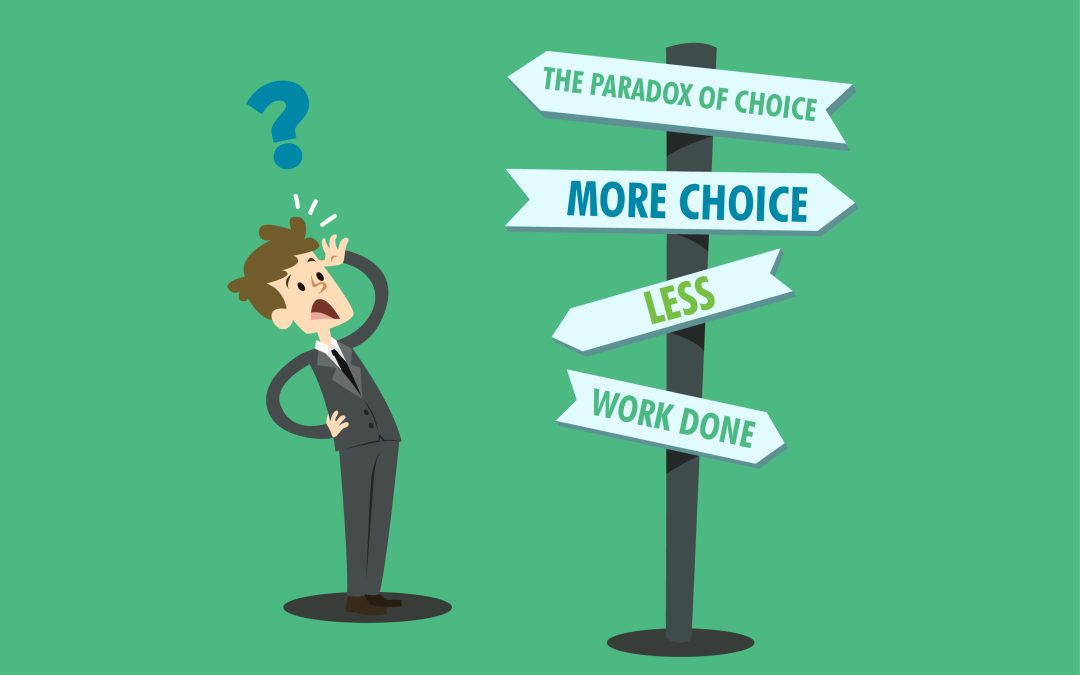
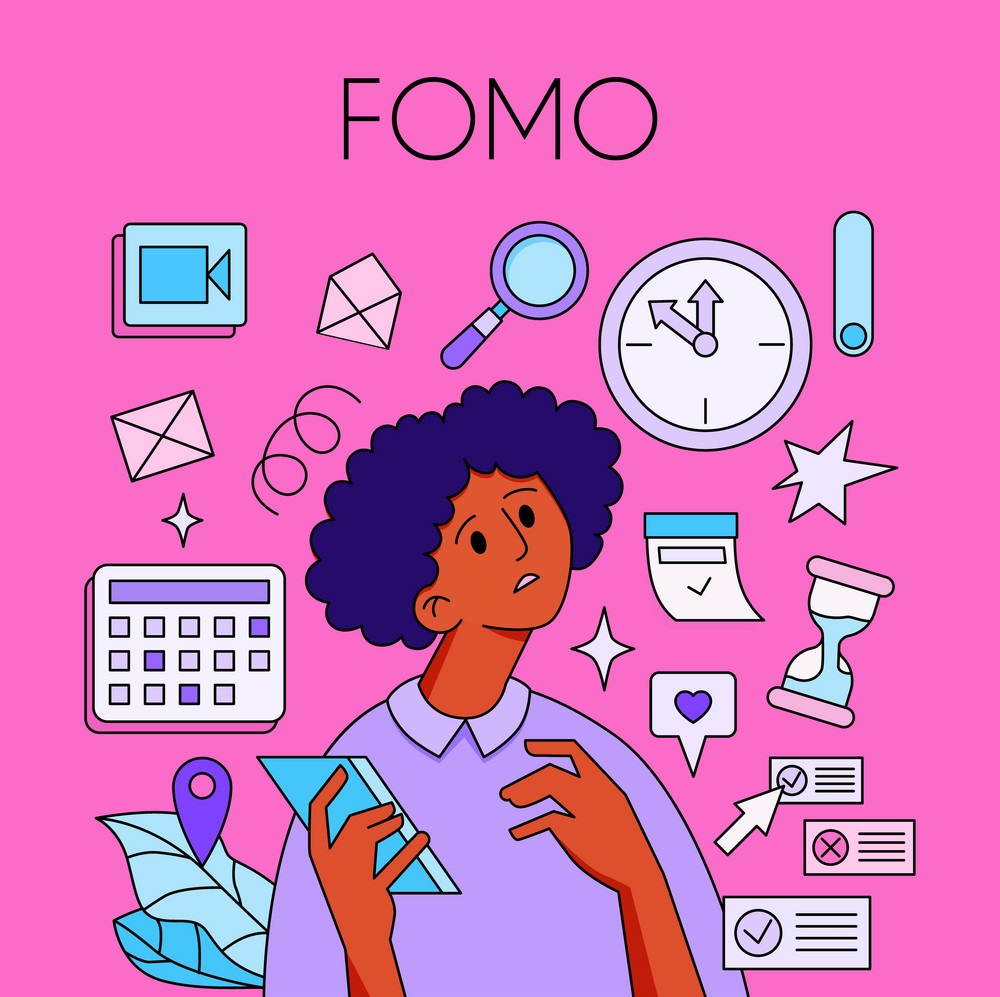
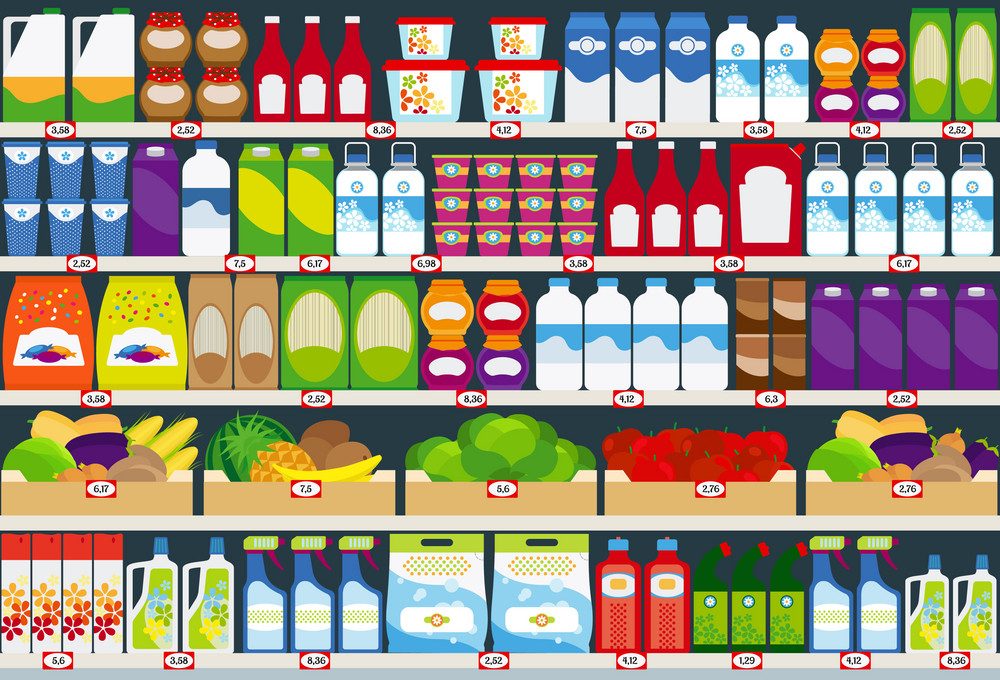

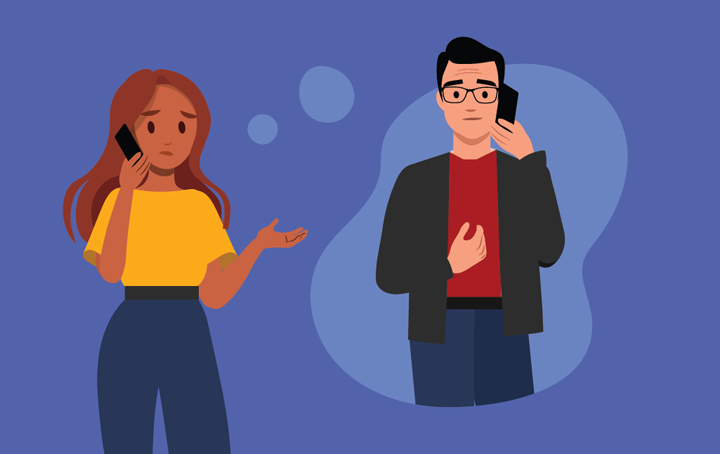

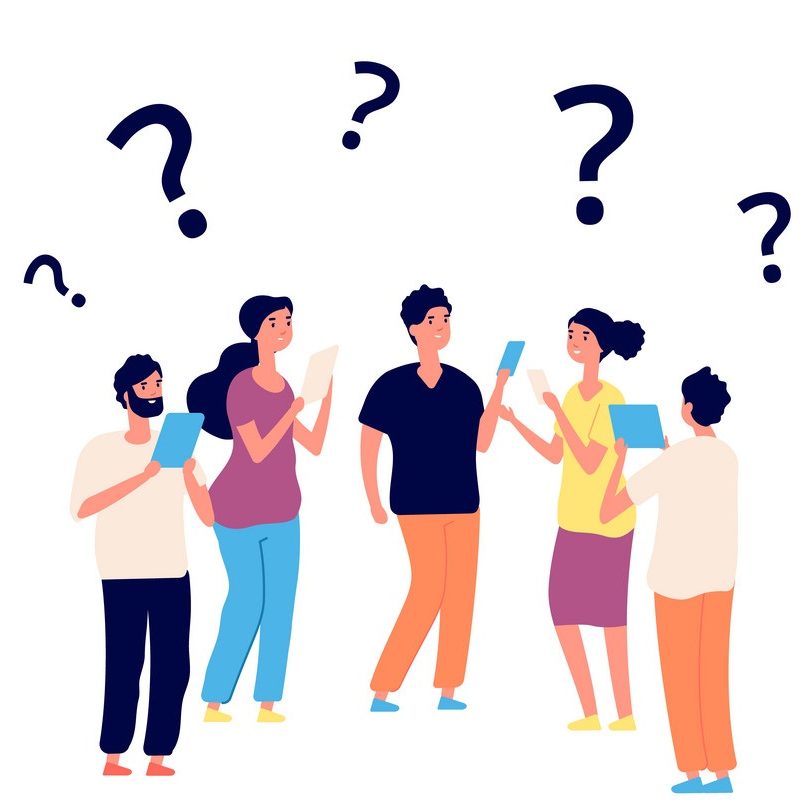
Interesting insights over a topic I was completely unaware of. Very useful tools given in order to make quicker decisions. I will definitely apply one of the techniques in the near future when I will have to decide my future job!
Thank you so much for reading! I’m glad you were able to discover something new by reading my post, and I really hope the outlined techniques will come in handy whenever you might need them.
As a person working in Human Resources, we always research on topics such as this for our T&D sessions.
This was a very interesting to read!
Thank you so much for reading! I’m happy to know that decision-making is a topic of interest in the HR field as, in my opinion, being able to make decisions efficiently and smoothly is a crucial skill for any professional.
The concept of FOBO is very interesting, and now that I am aware of it, I can see how it may influence aspects of my and my peers’ lives. It’s certainly interesting to learn about a new concept that has been influencing your decisions for many years.
Thank you so much for reading! I’m glad that you could learn something new through my post. I hope you’ll remind of it whenever you’ll need to make an important decision.
Really interesting read, I like that you broke down the different categories. I think this is an important thing to understand within marketing also, offering too many options can sometimes be a negative thing. I know for me at times if I’m making a purchase online, too many options means having to figure out what option would be best and often I’ll leave without purchasing – especially if it’s something I want and not necessarily need.
Thank you so much for reading! The same happens to me when I’m shopping online: I want to buy a product, but there are too many options, so I leave without buying, and I even forget that I wanted to purchase something until I receive a reminder email. This is certainly good for my wallet, but so frustrating when I realise I wasted precious time. The key is to prioritise and be decisive; otherwise, we’ll forever dwell on our decisions.
It’s not easy to make decisions but this post helps break it down! An insightful read 🙂
Thank you so much for reading! My aim was exactly to bring people to reflect on how they make decisions and give them some tips, so I’m glad you’ve found my post insightful.
I find it difficult to make decisions because of my anxiety about the unknown. This blog is a great guide on self-reflection. Thank you 🙂
Thank you so much for reading! I’m so happy you’ve found it useful!